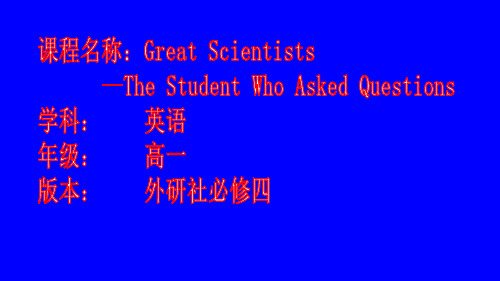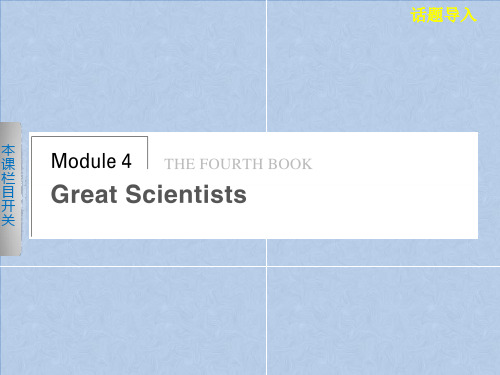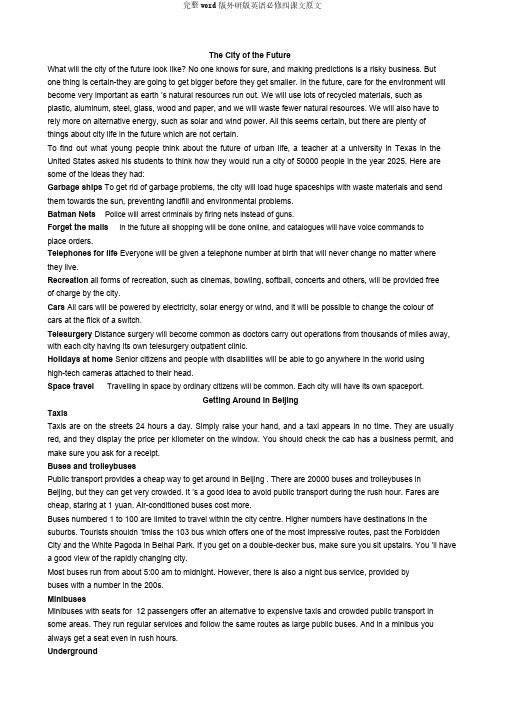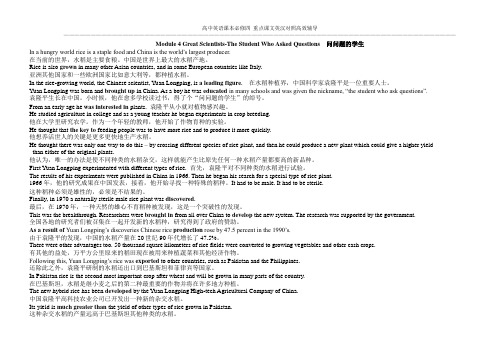外研版高中英语必修4
外研版英语必修四单词(打印版)

必修四 Module 1 brick 砖concrete 混凝土 mud 泥alternative 替换的 crime 罪行 for sure 肯定地 prediction预测risky 危险的, 冒险的resource 资源 [pl]run out ( 某物 )用完 ,不多了 material 材料 rely 依赖 ,依靠 rely on 依靠 solar 太阳的urban 都市的 ,老实的 get rid of 除掉 ,处理掉 load 装载landfill 垃圾填埋地 arrest 逮捕 ,拘留 criminal 罪犯 ,犯人 fire 开火 , 启动 limit X 围 [pl] outdoors 户外 online 联机地 catalogue 目录 command 命令 .指令 recreation 娱乐 ,消遣 bowling 保龄球游戏 softball 垒球charge 费用, 价钱 free of charge 免费 power 供应动 力 flick 轻打,轻弹switch 开关 ,交换 ,调换 surgery 外科手 术 telesurgery 远距离手 术 outpatient 门诊病人 clinic 诊所disability 失去能力 , 伤残 attach 系 ,贴, 连接 spaceport 宇航基地 useup 用完look out 小心 ,留神 return 往返票 mind readeroptimistic 乐观 的 explore 探索能看透别人心思的人 dishwasher 洗碗碟机 roadworkconscious 自觉地 definitely 无疑地 道路施工 [pl]ankle 脚踝 eventually 最后终于 switch off关上,断掉 eyebrow 眉毛for a start 首先 keep cool 保持冷静lip 嘴唇on the way out 即将 blow 吹响wrist 手腕 被淘汰 ,即将过时 horn 喇叭 ,号角bend 弯下腰 colony 殖民地 react 反响hug 紧抱 predict 预言, 预料solution解答 ,答案stare 盯着看shape 造成 ...形状 mood 心情 ,心境 wipe 擦 pad ( 动物的 )脚 no way没门儿lift up 举起 doormat 门前擦鞋 垫congestion 拥塞 up and downregistration执照一上一下地 Module 2religion XXtrolleybus 电车 Module 3host主任be connect tocommunication 沟通 by accident 偶然地与 ...相连 communicate 交流toast 干杯 wire 电线unconscious 无意的 sip 小口喝suburban 郊区的 vary 变化blank 空白的 be 被困在 ...on guard ( 保持 )警觉panic 恐慌 in no time 马上 ,一会 formal正式的rude粗鲁的display 展示 ,陈列 aggressive 攻击的 say hello tocab 计程车traditionally 传统地向...问好 permit 执照 ,许可证weapon 武器 switch on 翻开 receipt 收据gesture姿势invitation 邀请 get around 到 处 旅 threatening恫吓的request 请求 行deal 协议 ,交易RSVP 请答复 fare 车费make a dealfavour恩惠air-conditioned达成协议 live 现场的带空调的involve 包括 performance 表演 limit 限制slightly 轻微地 classical 古典的 destination 目的地 Muslim 穆斯林 [pl]applause 掌声 impressivesalaam 额手礼 judgement 判断给人印象深刻的forehead 前额prolong 延长 route 路线Hindu 印度人equality 平等double-deckerbow 鞠躬handclap 拍手双层公共汽车informal 非正式的social 社会的 provide 提供 youth 年轻人 infectiousunder construction hold up 举起有感染性的 正在建立之中palm 手掌funereal葬礼convenient 方便的spreadX 开pedal 骑车slap 掌击Module 4 tricycle 三轮脚踏车 give away暴露biochemistrysingle 单程票生物化学biology 生物学 botany 植物学 genetics 遗传学 zoology 动物学 staple 主要的producer 生产者 leading 主要的 figure 人物 bring up 培养 educate 教育 nickname 绰号 agriculture 农业 breeding 培育 species 种类yield 产量 original 原来的 publish 出版 sterile 不孕育的 breakthrough 突破 support 支持 as a result of由于 ...的结果production 产量 convert 改变 ,转换 cash crop 经济 作物 export 出口 hybrid 杂交种 agricultural 农业的 replace 取代 quantity 数量 quality 质量be known for 因 ...知名 best-seller 畅销书 (等 ) cosmology 宇宙 论 diagnose 诊断motor neurone disease运动神经元病victim 受害者 brilliant聪颖的 career 生涯 brief 简短的 partly 局部地 physical 身体的 graduate 毕业personal 个人的 in the distance cover 占地 (面积 ) relativity 相对论遥远 的 adapt 适应earn one ’s living 谋cruise 巡航disappear小时 生forbid 制止 extinct 绝种 的 come to power 掌权 lounge 休息室 evolve 进化 rocket 火箭 mountainous 多山的 die out灭绝millennium 千年 immense 巨大的 throw light on gunpowder 火药fertile 肥沃的 帮助弄清楚 explosion 爆炸 remote 遥远 的 come straight to explode爆炸steep陡峭的the point 开门见 山 escape 逃跑 varied 多变化的 fierce凶猛的arrow 弓箭 spot 地点 ,场所 destruction 毁坏 straight直的rip off 敲诈 generous 大方的clear ( 烟雾 )消散get a kick out ofunpredictable从...得到乐趣 变化莫测的Module 5 view 风光 emperor 皇帝cave 山洞 pin 别针robe 长袍peak 山顶 naturally 自然低 reputation 名誉 plain 平原torch手电筒border 边境plateau 高原positive 正面的 shore 岸 Module 6 indicate 象征 ,暗示slope 斜坡monster 怪物 identity 身份,特性valley 山谷 attack袭击due to 由于 wood 树林 [pl] footprint 脚印 myth神话故事flat 平坦的hairy 多毛的 fortune 命运,财富at the edge offrightening 吓人的在... 边缘 creature 生物 surround 围绕 grey 灰色的 colleague同事claw 爪 downstream 向下游exist 存在 goods 货物 sharp 锋利的 trade 做生意nail 指甲 ,爪 temple寺庙journal 杂志dock 码头sighting 目击 ,发现 hilly 多山的seal 海报raft 木法mysterious 神秘的 narrow 变狭 窄 claim 声称 at least 至少 surface 外表 detour 绕行之路 horn ( 动物头上 )角 legend传奇dive 潜水 be heavy withcalm平静的有大量的 ......sceptical 疑心的 deck 甲板unlikely不可能的distant遥远的volcanic 火山的exploit 开发。
外研版高中英语必修四Book 4 Module 4 reading The Student who Asked Questions教学课件

Para.5-6
What are the effects of Yuan Longping’s discoveries? As a result of Yuan Longping’s discoveries,Chinese
rice production _______47.5 percent in the 1990s.
批注本地保存成功开通会员云端永久保存去开通
Module 4 Great Scientists
Qian Xuesen Marie Curie Archimedes Stephen Hawking Albert Einstein
a. Theory of Relativity b. Father of China’s aerospace c. discovered Radium(镭) d.“therapies of devastating parasitic
He the
sFpAokOehoafst_he_se_tn_ime_e_ad_t_te_od_j_o,inthtlayt
fight over
world hunger. In fact, the next decade, the
demand ands_u_p__p_ly__of the world’s three major _c_e_r_e_a_l_s_:
1. What is the problem mentioned in the video? 2. Who can possibly ease this problem?
He spoke of the need to jointly fight world hunger. In fact, the FAO has___________, that over the next decade, the demand and _______of the world’s three major ________: wheat, rice and corn, will be______. And, with more than a billion people__________, China has been continually making efforts to increase __________of its predominant _______food: rice.
外研社 高中英语必修四课文知识点归纳总结

外研版高一必修4知识点归纳Unit 1 Life in the Future重点词汇:alternative; arrest; brick; concrete; criminal; disability; entertainment 重点短语in the future 将来care for 照顾;关心plenty of 大量的think about考虑instead of 代替be able to能够attach to连接到;附属于have an accident 发生意外;出事故for a start开始on the way out 在路上a few of一些be made of由…制成throw away扔掉;丢弃for sure确定place an order 排列顺序语言点用法过关1. alternative adj. 替换的,可供选择的(二者中)选择其一的考点归纳(1) alternative energy 替代能源alternative ways 可供选择的方法(2) have no alternative but to do 除……别无选择as an alternative 作为一种变通的方法alternative to ……的替代物辨析:alternative 强调必须从两或多个中选一个choice 强调自由选择,不论选择的方式多或少preference 强调按自己喜欢的方式进行选择2. run out用完;耗尽考点归纳run after 追求;追赶run at 冲向;突袭run away 逃走;逃跑run into 偶然遇见;撞上;陷入3. rely on依赖;依靠考点归纳rely on/ upon s./ 依赖/依靠rely on sb. to do sth. 指望某人做某事rely on it that…相信……指望……辨析rely on 强调凭借经验判断是否可以相信或依赖,侧重于从人品、感情方面的依赖、信赖。
外研版高中英语必修4-单词表

adj. 正式的
aggressive adj. 攻 击 的 ; 挑 斗 adj. 攻 击 的 ; 挑 斗 的 ;
的;挑衅的
挑衅的
traditionally adv. 传统地
adv. 传统地
weapon n. 武器
n. 武器
gesture n. 姿势;姿态
n. 姿势;姿态
threatening 威胁的
SHB4 M3 communication communicate
unconscious adj. vary on guard formal adj aggressive traditionally weapon gesture threatening deal make a deal involve slightly Muslim
义的
的
dishwasher definitely eventually for a start
on the way out
colony predict shape pad doormat
SHB4 M2 trolleybus be connected to wire suburban be / get stuck in in no time display cab permit receipt
criminal n. 罪犯;犯人
n. 罪犯;犯人
fire vt. 开火;启动
vt. 开火;启动
limit n. (常作复数)范围
n. (常作复数)范围
outdoors adv. 户外
adv. 户外
online adv. 联机地
adv. 联机地
catalogue n. 目录
n. 目录
外研版高中英语必修4练习课件:Module 4 Great Scientists

本
塑像;v.认为;估计
课 栏
keep one’s figure保持体形
目
开 figure out弄明白(=make out);计算出(=work out)
关
话题导入
[语境助记2]
(1)He is an important political figure in Indian history. 他是印度历史上一位重要的政治人物。
栏 目
张爱玲是她那个时代最重要的作家之一。
开 关
(2)The army was led by him.
军队由他指挥。
(3)She was in the lead during the race. 她在赛跑中领先。 (4)Heart disease led to his father’s sudden death. 心脏病突发导致了他父亲的猝死。
栏 目
C.the difference between scientists and ordinary people
开 关
D.the difference between carpenters and people with
other jobs
话题导入
4.What’s the best title of the passage?
conditions.
本 B.With the condition changing,the result of the
课
栏 目
observation may also change.
开 C.Condition makes no difference to scientists.
关Hale Waihona Puke D.There’s no point for ordinary people knowing how
Unit 4 Developing ideas课件 高中英语外研版英语选择性必修第四册

what 引导主语从句 that 引导表语从句
2. Nonetheless, what is in no doubt is that the sharing economy is increasingly relevant to our daily lives as well as to the global economy. 本句中 nonetheless 意为 however / despite this fact,起到让__步__、___转__折_的功能 。what is ... is that ... 是两个名词性从句的组合,这样的结构既可以让表达更加简洁,避
免头重脚轻的情况,还可以起到对主语和表语内容的强调作用。
writing
an essay about non-cash payments
Read the posts from an online forum. Complete the table with the correspondinn-cash payments, or electronic payments, bring us a lot of advantages. However, the disadvantages can’t be ignored. Maybe we could try to use money less often, rather than replacing it with non-cash payments for ever. Meanwhile, we need to think of ways to make non-cash payments better, friendlier and more scientific.
外研版英语必修四课文原文

The City of the FutureWhat will the city of the future look like? No one knows for sure, and making predictions is a risky business. Butone thing is certain-they are going to get bigger before they get smaller. In the future, care for the environment will become very important as earth ’s natural resources run out. We will use lots of recycled materials, such as plastic, aluminum, steel, glass, wood and paper, and we will waste fewer natural resources. We will also have torely more on alternative energy, such as solar and wind power. All this seems certain, but there are plenty ofthings about city life in the future which are not certain.To find out what young people think about the future of urban life, a teacher at a university in Texas in the United States asked his students to think how they would run a city of 50000 people in the year 2025. Here are some of the ideas they had:Garbage ships To get rid of garbage problems, the city will load huge spaceships with waste materials and send them towards the sun, preventing landfill and environmental problems.Batman Nets Police will arrest criminals by firing nets instead of guns.Forget the malls In the future all shopping will be done online, and catalogues will have voice commands toplace orders.Telephones for life Everyone will be given a telephone number at birth that will never change no matter wherethey live.Recreation all forms of recreation, such as cinemas, bowling, softball, concerts and others, will be provided freeof charge by the city.Cars All cars will be powered by electricity, solar energy or wind, and it will be possible to change the colour ofcars at the flick of a switch.Telesurgery Distance surgery will become common as doctors carry out operations from thousands of miles away, with each city having its own telesurgery outpatient clinic.Holidays at home Senior citizens and people with disabilities will be able to go anywhere in the world usinghigh-tech cameras attached to their head.Space travel Travelling in space by ordinary citizens will be common. Each city will have its own spaceport.Getting Around in BeijingTaxisTaxis are on the streets 24 hours a day. Simply raise your hand, and a taxi appears in no time. They are usually red, and they display the price per kilometer on the window. You should check the cab has a business permit, and make sure you ask for a receipt.Buses and trolleybusesPublic transport provides a cheap way to get around in Beijing . There are 20000 buses and trolleybuses in Beijing, but they can get very crowded. It ’s a good idea to avoid public transport during the rush hour. Fares are cheap, staring at 1 yuan. Air-conditioned buses cost more.Buses numbered 1 to 100 are limited to travel within the city centre. Higher numbers have destinations in the suburbs. Tourists shouldn ’tmiss the 103 bus which offers one of the most impressive routes, past the ForbiddenCity and the White Pagoda in Beihai Park. If you get on a double-decker bus, make sure you sit upstairs. You ’ll have a good view of the rapidly changing city.Most buses run from about 5:00 am to midnight. However, there is also a night bus service, provided bybuses with a number in the 200s.MinibusesMinibuses with seats for 12 passengers offer an alternative to expensive taxis and crowded public transport insome areas. They run regular services and follow the same routes as large public buses. And in a minibus you always get a seat even in rush hours.UndergroundThere are four underground lines in Beijing, and several lines are under construction. Trains are fast and convenient, but rush hours can be terrible. A one-way trip costs 3 yuan. Station names are marked in pinyin. The underground is open from 5:00 am to 11:00 pm.PedicabsTourists like these human-pedalled “tricycle taxis ”, but they can be expensive. You should talk to the driver, and make sure you know the price before you begin the journey, for example, if it is per person, single or return. Tricycles are worth using if you want to explore the narrow alleys (hutong) of old Beijing.Body Language and Non-verbal CommunicationIf you say the word “communication ”, most people think of words and sentences. Although these are very important, we communicate with more than just spoken and written words. Indeed, body positions are part of whatwe call “body language ”. We see examples of unconscious body language very often, yet there is also“learned”body language, which varies from culture to culture.We use “learned”body language when we are introduced to strangers. Like other animals, we are on guard untilwe know it is safe to relax. So every culture has developed a formal way to greet strangers, to show them we arenot aggressive. Traditionally, Europeans and Americans shake hands. They do this with the right hand— the strongest hand for most people. If our right hand is busy greeting someone, it cannot be holding a weapon. So the gesture is saying, “Itrust you. Look , I ’m not carrying a threatening weapon. ”If you shake hands with someone, you show you trust them. We shake hands when we make a deal. It means, “We agree and we trust each other.” Greetings in Asian countries do not involve touching the other person, but they always involve the hands. Traditionally in China, when we greet someone, we put the right hand over the left and bow slightly. Muslims givea “salaam”, where they touch their heart, mouth and forehead. Hindus join their hands and bow their heads in respect. In all of these examples, the hands are busy with the greeting and cannot hold a weapon.Even today, when some people have very informal styles of greeting, they still use their hands as a gesture of trust. American youths often greet each other with the expression, “Give me five! ”One person then holds up his hand, palm outwards and five fingers spread. The other person raises his fingers spread. The other person raises hishand and slaps the other’s open hand above the head in a“high five ”.Nowadays, it is quite a common greeting.Body language is fascinating for anyone to study. People give away much more by their gestures than by their words. Look at your friends and family and see if you are a mind reader!The Student Who Asked QuestionsIn a hungry world rice is a staple food and China is the world’s largest producer. Rice is also grown in many other Asian countries, and in some European countries like Italy. In the rice-growing world, the Chinese scientist, Y uan Longping, is a leading figure.Yuan Longping was born and brought up in China. As a boy he was educated in many schools and was given the nickname, “the student who asks questions”.From an early age he was interested in plants. He studied agriculture in college and as a young teacher he began experiments in crop breeding. He thought that the key to feeding people was to have more rice and to produce it more quickly. He thought there was only one way to do this — by crossing different species of rice plant, and then he could produce a new plant which could give a higher yield than either of the original plants.First Yuan Longping experimented with different types of rice. The results of his experiments were published in China in 1966. then he began his search for a special type of rice plant.It had to be male.It had to be sterile. Finally, in 1970 a naturally sterile male rice plant was discovered. This was the breakthrough. Researchers were brought in from all over China to develop the new system. the research was supported by the government.As a result of Yuan Longping ’s discoveries Chinese rice production rose by 47.5 percent in the 1990 ’s. There were other advantages too. 50 thousand square kilometres of rice fields were converted to growing vegetables and other countries, such as Pakistan and the Philippines.In Pakistan rice is the second most important crop after wheat and will be grown in many parts of the country. Thenew hybrid rice has been developed by the Yuan Longping Hightech Agricultural Company of China. Its yieldis much greater than the yield of other types of rice grown in Pakistan.A Trip Along the Three GorgesIn August 1996, Peter Hessler, a young American teacher of English, arrived in the town of Fuling on the Yangtze River. He and a colleague were to spend two years there teaching English at a teacher training college. They were the only foreigners in the town. The first semester finished at the end of January and they had four weeks off forthe Spring Festival. They could go anywhere they wished. They decided to take a boat downstream.We decided to buy tickets for the Jiangyou boat. Our colleagues said,“You shouldn’tgo on those ships. They are very crowded. They are mainly for goods and people trading along the river. They don’tstop at the temples and there won ’tbe any other foreigners. ”That sounded fine to me. We just had to show our passports and they let us get on the boat.We left the docks on a beautiful afternoon. The sun was shining brightly as we sailed downstream through a hilly region. Men rode a bamboo rafts along the river ’s edge and coal boats went past. As the sun setting behind the white pagoda. It was beautiful.We slept through the first gorge, which is called the Qutang Gorge. The gorge narrows to 350 feet as the river rushes through the two-mile –high mountains. “Oh,well, ”my friend said, “at least we have two more left. ”At Wushan we made a detour up the Daning River to see some of the smaller gorges. The next day we wentrdthrough the big gorges on the Yangtze River,home of Qu Yuan, the 3century BC poet. There was so much history along the Yangtze River. Every rock looked like a person or animal, every stream that joined the greatriver carried its legends, every hill was heavy with the past.As we came out of the third gorge, the Xiling Gorge,we sailed into the construction site of the dam. All the passengers came on deck. We took pictures and pointed at the site, but we weren ’tallowed to get off the boat. The Chinese flag was blowing in the wind. In a distantmountain was a sign in 20-foot characters. “Build the Three Gorges Dam, Exploit the Yangtze River, ”It said.The Monster of Lake TianchiThe “Monster of Lake Tianchi ”in the Changbai Mountains in Jilin province, northeast China , is back in the news after several recent sightings. The director of a local tourist office, ,Meng Fanying, said the monster, which seemed to be black in colour, was ten metres from the edge of the lake during the most recent sighting. “Tt jumped out of the water like a seal — about 200 people on Changbai ’s western peak saw it, ”he said, Although noone really got a clear look at the mysterious creature, Xue Junlin, a local photographer, claimed that its head looked like a horse.In another recent sighting, a group of soldiers claim they saw an animal moving on the surface of the water. The soldiers, who were walking along the side of the lake, watched the creature swimming for about two minutes.“It was greenish— black and had a round head with 10 —centimetre horns ”, one of the soldiers said.A third report came from Li Xiaohe, who was visiting the lake with his family. He claims to have seen a roundblack creature moving quickly through the water. After three or four hundred meters it dived into the water. Ten minutes later the monster appeared again and repeated the action. Mr Li Xiaohe said that he and his familywere able to see the monster clearly because the weather was fine and the lake was calm.There have been reports of monsters in Lake Tianchi since the beginning of the last century, although no one has seen one close up. Some photos have been taken but they are not clear because it was too far away. Many people think the monster may be a distant cousin of the Loch Ness monster in Scotland. They also think that there mightbe similar creatures in other lakes around the world.Scientists, however, are skeptical. They say that thelow-temperature lake is unlikely to be able to support such large living creatures.Lake Tianchi is the highest volcanic lake in the world. It is 2189 metres high and covers an area of about ten square kilometres. In places it is more than 370 metres deep.。
外研版高中英语必修4 module 4 课文翻译(带要点)

高中英语课本必修四重点课文英汉对照高效辅导—————————————————————————————————————————————————————————————————————————Module 4 Great Scientists-The Student Who Asked Questions 问问题的学生In a hungry world rice is a staple food and China is the world’s largest producer.在当前的世界,水稻是主要食粮。
中国是世界上最大的水稻产地。
Rice is also grown in many other Asian countries, and in some European countries like Italy.亚洲其他国家和一些欧洲国家比如意大利等,都种植水稻。
In the rice-growing world, the Chinese scientist, Y uan Longping, is a leading figure. 在水稻种植界,中国科学家袁隆平是一位重要人士。
Y uan Longping was born and brought up in China. As a boy he was educated in many schools and was given the nickname, “the student who ask questions”.袁隆平生长在中国。
小时候,他在愈多学校读过书,得了个“问问题的学生”的绰号。
From an early age he was interested in plants. 袁隆平从小就对植物感兴趣。
He studied agriculture in college and as a young teacher he began experiments in crop breeding.他在大学里研究农学。
- 1、下载文档前请自行甄别文档内容的完整性,平台不提供额外的编辑、内容补充、找答案等附加服务。
- 2、"仅部分预览"的文档,不可在线预览部分如存在完整性等问题,可反馈申请退款(可完整预览的文档不适用该条件!)。
- 3、如文档侵犯您的权益,请联系客服反馈,我们会尽快为您处理(人工客服工作时间:9:00-18:30)。
专家点评(西安市第26中学杨筱冰)
本节课是一节阅读课,从教学设计到课堂教学都能体现新课标精神。
对教材分析、教学目标的设定、重难点的把握以及教学环节的设计,能体现对学生能力的培养。
教学中导入部分通过多媒体图片及问题的展示,生动形象,紧紧抓住学生的注意力,激发了学生的学习兴趣。
课堂重视学生自主学习和合作学习能力的培养,师生配合默契,课堂气氛融洽。
在课堂上让学生用所学句型自由讨论,学生积极参与,通过活动既巩固了所学知识,提高了灵活运用所学语言的能力。
即提高了他们的听、说、读、写和语言交际的能力。
本节课达到了预期效果。
但是,也有一些不足之处:在时间的分配上还有待改进,以突出重点。
例如:精读部分给学生自己读的时间太少,不利于学生的理解。
